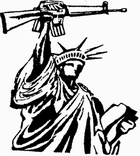Click Here to Puruse the old Flyover-press
Please Click ton Ab
Liberty knows no compromise
Click to Subscribe to Our Free Daily News Service
Donate today to help defray the costs of this important free newsletter
A Universal Ethic for All Mankind: A Detailed Review and Synopsis of The Ethics of Liberty
by Murray N. Rothbard
Chapter 9: Property and Criminality
Compiled and Edited
by
Dr. Jimmy T. (Gunny) LaBaume
A criminal is defined as anyone who initiates violence against another man and his property—e.g. anyone who uses the coercive “political means” for the acquisition of goods and services.
If you see A grabbing B's wristwatch, are you justified in concluding that A is a criminal? No. With only what you see to go on, you don't know for sure. A might actually be repossessing his own watch which B had previously stolen. You can only come to a true conclusion through “historical” inquiry.
It cannot be simply said that the great axiomatic moral rule is the protection of property rights, period. T hat basic rule must be clarified by saying that no one has the right to aggress against the legitimate or just property of another. In other words, we cannot defend “property rights” or of “private property” per se because, to do so, we might be defending the “property right” of a criminal aggressor.
The utilitarian has no conception or theory of justice. His view is that all currently existing titles to private property are valid. In other words, his ethic holds that all goods that are currently considered private property must be accepted and defended as such. This ethic is blind to justice. If it were logically pushed to its ultimate conclusion, every criminal would be defended in the property that he has expropriated.
The driving force for social and political change has been the theory of surplus value. This fallacious theory holds that capitalists have stolen the rightful property of the workers. This, in turn, renders existing titles to accumulated capital unjust. From this arises the call for “expropriation of the expropriators” and some form of “reversion” of ownership. Such arguments cannot be countered by utilitarian economics. The only rebuttal is to deal forthrightly with the moral problem of the justice or injustice of various claims to property.
Also, Marxist views can not be rebutted by utilitarian songs of praise to the virtues of “social peace.” If a social system is founded upon monstrously unjust property titles, not molesting them is not peace but rather the enshrinement and entrenchment of permanent aggression.
Furthermore, the Marxists can not be rebutted by pointing the finger at their use of violent overthrow. If capitalist property is morally illegitimate, then the right of the workers to employ whatever violence may be necessary to seize the property can not be denied.
Therefore, the only genuine refutation of Marxian revolution is that capitalists' property is just (rather than unjust) and that therefore its seizure would be unjust and criminal. However, we cannot get away with refuting revolutionary claims by arbitrarily placing the mantle of “justice” upon any and all existing property titles. In other words, surely cases can be found where violent expropriation of existing property titles can be morally justified because these titles are unjust and criminal.
Take, for example, a hypothetical country, “Ruritania” which is ruled by a king who has invaded the rights of persons and seized their property. Assume that a libertarian movement develops. The king sees the revolt to be imminently successful and therefore proclaims his government to be dissolved. But just before he does, he parcels out the “ownership” of the entire land area to himself and his relatives. He then says, “if you disturb this ownership in any way, you are infringing upon the sanctity of the very fundamental principle that you profess—the inviolability of private property. Therefore, while he is no longer be imposing ‘taxes,' he imposes ‘rents' and regulate the lives of all the people who live on his property.
Thus, we must take our stand on a theory of just (versus unjust) property. We cannot be utilitarians. We would claim the right to expropriate the “private” property of the king and his relatives and return it to the individual owners against whom he aggressed by imposing his illegitimate claim.
A corollary to this view is that, in the most fundamental sense, all property is “private.” If B steals A's watch, then no matter whether the watch is in A's or B's hands, it is in private hands. In some cases these hands are legitimate-private but in others they are criminal-private. But they are “private” just the same.
The same is true for individuals forming themselves into any sort of group. When the king and his relatives formed a “government” the form of private property differed but the essence did not. The question is not whether property is private or governmental, but whether the “private” owners are legitimate or criminal. Ultimately there is no entity called “government.” People form themselves into groups called “governments.” So, there is only one reason to oppose or call for the divestment of governmental property—the rulers are unjust and criminal owners of property.
How can this principle be applied? Wouldn't this inquiry into everyone's property title result in chaos? Also, what criterion can be established for the justice of these titles?” The criterion is explained above—e.g. every individual owns his person and the property that he has found and transformed, and/or acquired through gifts or voluntary exchange.
Existing property titles must be scrutinized. If it cannot be clearly shown that a property “owner” (or his ancestors) are criminals, then we must say that, since he has been possessing and using the property, he is the legitimate and just owner.
On the other hand, suppose that a title is clearly criminal. Must the current possessor give up the property? That depends on two things: (1) whether the victim (or his heirs) can be found and (2) whether or not the current possessor is himself the criminal who stole the property.
Suppose Jones possesses a watch to which the original title is criminal either because (1) his ancestor stole it or (2) he or his ancestor purchased it from a thief. If we can identify and find the victim (or his heir), then Jones's title is invalid. The watch properly reverts to Smith (or his descendants) without compensation.
On the other hand, suppose we cannot find the victim or his current heir. If Jones was the thief, he cannot be allowed to keep the watch. It is now in a state of no-ownership and must therefore become the legitimate property of the first person to “homestead” it.
Yet again, suppose that Jones is not the criminal and neither the victim nor his heirs can be found. The disappearance of the victim means that the stolen property comes properly into a state of no-ownership. Any good in a state of no-ownership becomes the legitimate property of the first person that comes along and uses it. Thus, this “first” person is clearly Jones who had been using the watch all along.
If the holder of an unjust title is not the criminal, he is entitled to the property which he added. However, the criterion should be whether or not the addition is separable from the original property.
For example, suppose Brown steals a car from Black and sells it to Robinson. The car must be returned to Black (the original owner) without compensation to Robinson. Of course, Robinson has a legitimate complaint against Black and should be able to sue him for damages caused by his fraudulent contract. Now, suppose Robinson has added a new radio to the car. Since it separable from the car, he should be able to remove it before returning the car to Black.
This analysis allows us to see the injustice of the current legal concept of the “negotiable instrument” (e.g., dollar bills). The non-criminal recipient or buyer is now deemed to be the owner and cannot be forced to return the property to the victim. Furthermore, special legislation has also made pawnbrokers into a similarly privileged class. If Brown steals a typewriter and pawns it, the pawnbroker may not be forced to return it to its just owner.
(Parenthetical Note: Title searches and insurance are common in the case of land purchase. In a free society, such insurance will apply to wider areas of private property rights and will be used extensively.)
The natural right of every man to the ownership of himself and the previously un-owned resources which he finds and transforms is the fundamental axiom of libertarian theory. From this axiom the absolute morality and justice of all current titles to property may be deduced. The only exceptions are where the origin of the current title is criminal and (1) the victim or his heirs can be identified and found, or (2) the victim cannot be found but the current title-holder is the criminal.
In the first case, the property reverts to the victim or his heirs. In the second, it becomes the property of the first appropriator to alter its un-owned state.
Thus, to restate our theory of the rights of property : “Every man has an absolute right to the control and ownership of his own body, and to unused land resources that he finds and transforms. He also has the right to give away such tangible property (though he cannot alienate control over his own person and will) and to exchange it for the similarly derived properties of others. Hence, all legitimate property-right derives from every man's property in his own person, as well as the ‘homesteading' principle of un-owned property rightly belonging to the first possessor.”
Likewise, we can articulate a theory of criminality : “A criminal is someone who aggresses against such property. Any criminal titles to property should be invalidated and turned over to the victim or his heirs; if no such victims can be found, and if the current possessor is not himself the criminal, then the property justly reverts to the current possessor on our basic ‘homesteading' principle.”
The fundamental axiom of libertarian theory is that each person is self-owning and no one has a right to interfere with his self-ownership. Thus it immediately follows that it is not only impermissible but impossible for one person to have a property right in another—e.g. private title did not make slavery legitimate.
The debate over whether or how much the slave owner should be monetarily compensated if slavery were to be abolished was (and still is) palpably absurd. We do not compensate a thief for the loss of a watch. In fact, it was the slaves who should have been compensated. Further, it is clear that any such compensation could only justly have come from the slaveholders themselves and not from the state (ordinary taxpayers).
Continue to the next chapter...
*Note: We hold no special government issued licenses or permits. We don't accept government subsidies, bailouts, low-cost loans, insurance, or other privileges. We don't lobby for laws that hurt our competitors. We actively oppose protectionism and invite all foreign competitors to try to under price us. We do not lobby for tariffs, quotas, or anti-dumping laws. We do not support the government's budget deficits: we hold no government or agency securities.
To Subscribe to our daily e-mail alert service, send an e-mail with the word "subscribe" on the subject line.
Visit Our Advertisers
Email for Advertising Rates
Use the link or send an email to: adinfo@flyover-press.com

